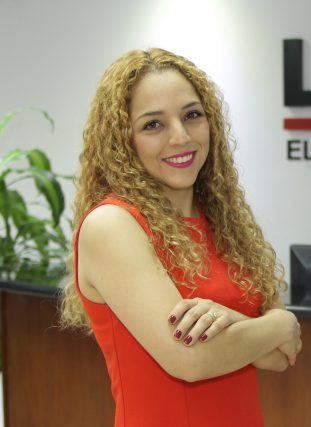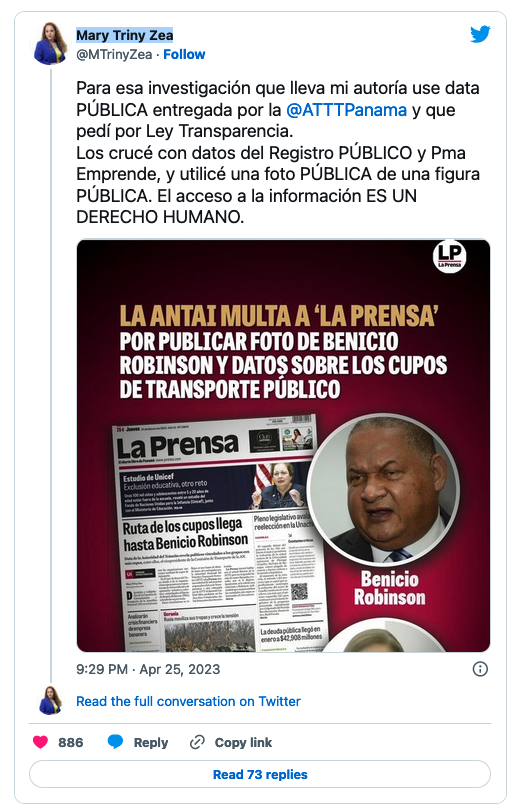Panama’s public transparency office has caused outrage among the country’s journalists by penalizing a major newspaper for publishing both a photo of an elected official and information obtained through a public record request.
The National Authority for Transparency and Access to Information, known as ANTAI, fined La Prensa — an ICIJ partner — in March, following a high-profile investigation that revealed public officials obtaining and selling transportation permits.
The $5,000 fine is just one recent example of the erosion of press freedom in Latin American countries. The World Press Freedom Index, published today, ranked Panama 69th amid a worrying global backslide.
The index warned that Panamanian journalists, particularly those criticizing government policy or corruption, are frequently the targets of legal threats, which has led to increased self-censorship.
In a statement, the Panamanian chapter of Transparency International warned the country’s democracy is at a “critical” inflection point, “due to the increasing judicial harassment suffered by journalists and the media, as well as a dangerous setback in the institutions called to protect transparency.”
On World Press Freedom Day, ICIJ talks to member Mary Triny Zea, who authored the investigation that led to the fine. Zea, who worked for La Prensa’s investigative unit for 14 years, is now Panama’s editor for Bloomberg Línea.

What was your investigation about and how did it lead to a complaint to the office of transparency (ANTAI)?
The investigation revealed who received public transport concessions in Panama. These concessions or permits are granted by the Transit and Land Transportation Authority. I requested the information under the national transparency law and, at first, the [transport] authority was reluctant to deliver it. It took several months. In fact, the same information was also requested by an independent congressman at the time and [his request] was denied.
It has always been rumored that, here in Panama, these concessions, which are similar to permits for public transport operators, are often given to politicians instead. Then, the concessions that are supposed to be free are instead sold in the market for more than $10,000 each. The people who actually drive the buses and taxis have to buy these concessions for more than $10,000 in the market.
I made a public records request under the [national] transparency law for the list of concessions, who their beneficiaries are, and other data. I used it to uncover the beneficiaries of each province in Panama: the companies, the organizations, the cooperatives. I organized the data, cleaned it, and obtained more information from other open databases in Panama. The investigation revealed multiple politicians from multiple parties had transportation concessions.
Congressman Benicio Robinson, who filed the complaint with the transparency authority, claimed his privacy was violated, as was the data protection law, and the transparency authority agreed with him and fined the newspaper that published my investigation, and also prosecuted me. It was going to penalize me as well, but it didn’t because it considered me to be subordinate to the newspaper. But the fine [to the newspaper] was $5,000. So, according to the transparency authority, the congressman’s privacy and the data protection law were violated by publishing a photo of him without his authorization, when, I reiterate, he is a public figure and the photo was taken in the exercise of his public duties.
If you put together all the pieces of a puzzle, it gives you an idea of the macabre game the sectors of power are playing
-Mary Triny Zea
The investigation revealed that the congressman [who filed the complaint] received the concessions. That is, they were granted to him directly and indirectly … despite the conflict of interest. A congressman cannot directly or indirectly obtain concessions from the state, per the Panamanian constitution.
Editor’s note: Congressman Robinson declined to comment prior to the publication of La Prensa’s investigation. He made his complaint to the transparency authority after the story was published. On March 27, La Prensa published that Robinson’s attorney told the newspaper the information in the investigation is false although the congressman told other media outlets he is a “concessionary” in the transportation business.

What is the data protection law, and how has it impacted press freedom in Panama?
This law seeks to protect the personal data of citizens because credit, banking, telephone entities and others have been selling databases used for commercial purposes, including names, IDs and telephone numbers. However, this law is being applied to restrict journalism by limiting the release of public information under the transparency law, supposedly based on principles of not violating the data protection law.
I’ll give you an example: Did you know that the government has restricted the minutes of the cabinet council? This administration is now reforming the transparency law, Law 6 of 2002, in a pre-election year, without consulting the civil society groups that have fought for years for transparency and for the creation of said law.
If you put together all the pieces of a puzzle, it gives you an idea of the macabre game the sectors of power are playing: one, by restricting information; two, by penalizing journalists and the media for doing its job of revealing hidden information, information the government does not want to disclose to the public; and three, by reforming a transparency law that — despite the fact we have a toothless transparency authority — is the only law we have to guarantee journalists and citizens access to public information for oversight.
Editor’s note: In a statement issued following the public backlash, ANTAI said La Prensa’s petition to reconsider the fine is being processed and the penalty was imposed based on “clear precepts” established in the law.
The office of transparency didn’t just take issue with publishing the photo of a public official. ANTAI also declared that the information — obtained through a public records request — should not have been published. What is the basis for that argument?
The information on the concessions was given to me by the transit authority in response to a public records request I made under Panama’s transparency law.
[La Prensa] is the second media outlet to be prosecuted by the transparency authority and fined, and the authority has also targeted journalists. In my case, there was no penalty because the transparency authority considered me subordinate to the newspaper that published the story, not because it considers me innocent.
This means that, according to ANTAI, because I published a report with [information obtained by a public records request] and a public photo of a public servant who, by the way, wields a lot of political influence in Panama, I violated the data protection law, despite not being the guardian of that data. It was given to me, I processed it in an Excel spreadsheet and followed the typical journalistic process of investigating who received the concessions, and how they are linked to the government.
– The International Consortium of Investigative Journalists (ICIJ)
Stay informed with The Namibian – your source for credible journalism. Get in-depth reporting and opinions for
only N$85 a month. Invest in journalism, invest in democracy –
Subscribe Now!







